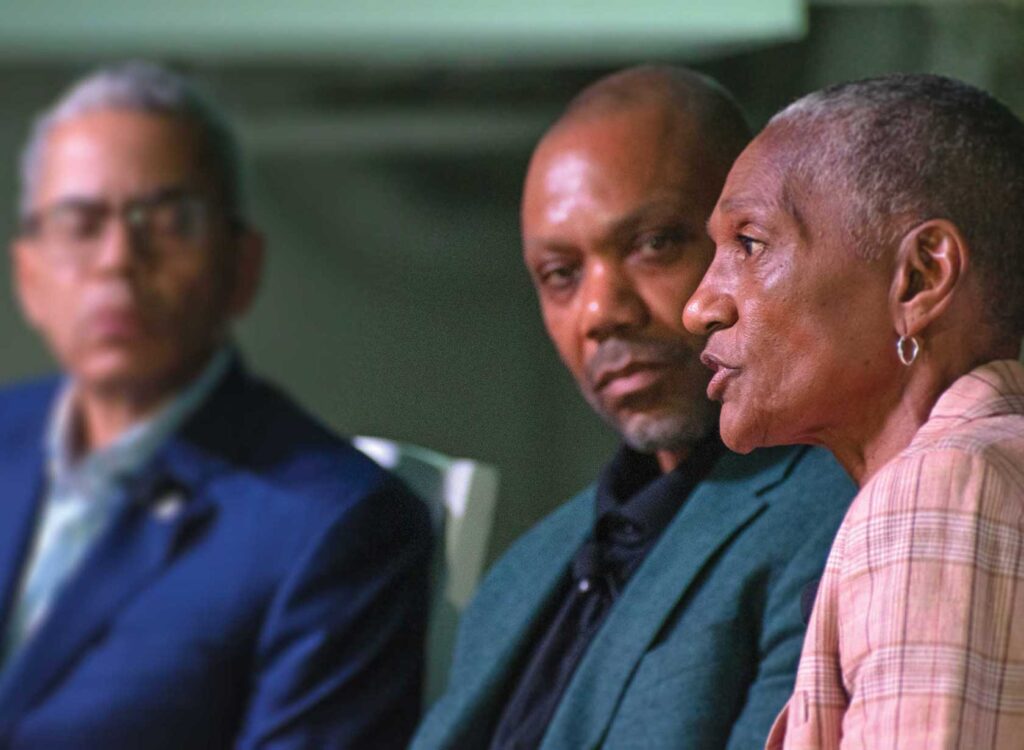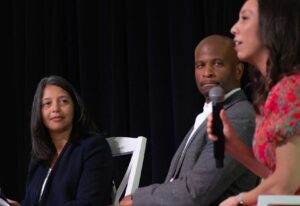
New solutions — and now — was the name of the game for health care leaders at the Boston Medical Center’s EQTY 2024 summit last week.
Throughout the day-long conference, held Sept. 12 at the Artists for Humanity EpiCenter in South Boston, attendees talked about what steps local organizations are taking — and what work could be done — to address disparities in access to care. Throughout it all, the urgent call for novel solutions was constant.
The problems the attendees discussed are nothing new — for example, disparities in maternal morbidity, unequal exposure to environmental harms and persistent distrust in a medical system that has not treated patients of color the same as their white counterparts.
“We innovate in this space for those who have little motivation to believe the health care system is for them. And they are not mistaken,” said Dr. Thea James, vice president of mission and associate chief medical officer at BMC.
That innovation took a spotlight at the summit, with four organizations working to improve health care access explaining their areas of focus in short presentations scattered throughout the event.
Those presentations covered work like that of ThriveLink, a Missouri-based company that uses AI and community health workers to connect community members with programs like health insurance and SNAP benefits, bringing mental health care into communities with a mobile clinic, making food as medicine more culturally connected and making mindfulness interventions more culturally sensitive.
“Practically speaking, [innovation] is when people say, ‘This is not ok,’ ‘This is not normal,’ or ‘There has to be a better way,’” said Sheila Phicil, the outgoing director of innovation at the BMC’s Health Equity Accelerator.
But also in focus were the smaller, more everyday types of innovation that BMC leadership said they see from their patients on a regular basis — everyday people juggling the complexities of life to make sure they and their loved ones have access to care, even while facing barriers in transportation or timing.
A growing focus on equity

Nikole Hannah-Jones, staff reporter for the New York Times Magazine, discusses her work with the 1619 Project and the historical legacies that have created present-day health inequities during a keynote fireside chat at the EQTY 2024 health equity summit. “The society we have is a choice. … It doesn’t have to be this way,” she said at the conference. PHOTO: AVERY BLEICHFELD
Change in how health care is delivered, especially for communities who have historically been left out, has been an intensified focus at Boston Medical Center in recent years, following the COVID-19 pandemic and the murder of George Floyd.
In 2021, the health system launched its Health Equity Accelerator, an effort within the hospital to eliminate gaps in care, especially when it comes to pregnancy, cancer, infectious diseases, chronic conditions and behavioral health.
“Health equity really is at the core of how we practice academic medicine, and it requires transformative thinking, challenging the status quo and working with the community to co-create programs that can serve as national models,” said Dr. Alastair Bell, BMC’s president and CEO, during remarks at the summit. “We have to consistently ask ourselves, ‘How can we continue to drive this transformational change, and where do we go next?’”
That work has also included a health equity fellowship, developed and launched quickly, according to Emily Cleveland Manchanda, a BMC physician who co-directs the program, to help staff at the hospital learn to provide more equitable care and unlearn biases they might have.
That program recently graduated its first class, a doctor and a nurse, who together developed an interactive anti-racism workshop to be offered to staff. Their work also included the creation of an 18-month curriculum for pediatric medicine residents and the establishment of a nursing DEI council.
Hospital-community partnerships
BMC isn’t the only local health organization with efforts to advance equity. During the summit, Dr. Elsie Taveras, chief community health and health equity officer at Mass General Brigham, said she is helping to lead the formation of a partnership between her organization and BMC as well as the Mattapan Community Health Center that aims to bring care out of hospitals and into the communities that need it most.

Dr. Elsie Taveras (left), chief community health and equity officer at Mass General Brigham, sits on a panel about getting health services out of hospitals and into communities — an effort advocates say will help increase access to care — at Boston Medical Center’s EQTY 2024 health equity summit, Sept. 12. PHOTO: AVERY BLEICHFELD
“When I started, about three years ago, I was interested in thinking about, what does the data tell us about what are the most prevalent conditions that are causing people to die prematurely, where are there greatest inequities? If you use data to inform that, all roads lead to Mattapan, Dorchester and Roxbury,” Taveras said, pointing to statistics from the Boston Public Health Commission that identified significant disparities among the city’s neighborhoods.
Earlier this year, the health commission launched its own equity effort based on the data, with a focus on cardiometabolic disease, preventable cancers and opioid overdoses.
Like BMC’s work, Taveras said her effort stemmed from what she saw during the COVID-19 pandemic. Even after years of working to address disparities in care leading up to 2020, she said that it had little impact in changing who was facing inequitable affects from the pandemic.
“At the end of the day, the very populations that I went into medicine to serve were the ones that were landing in our hospitals, the ones that were dying,” Taveras said. “All of the work that we’d done — all of the academic work that I had done — none of it was ready or was doing anything to provide solutions.”
That led her to a push to move beyond research toward impact and action.
“Enough with analyzing, enough with saying that we’re going to do another study to identify the inequities,” she said. “We need to move and provide solutions through policies, through really well-designed interventions and programs.”
Tying solutions to root causes
At the event, the focus on new solutions was tied to understanding and addressing the root causes that led to today’s health disparities.
The retrospective perspective was underscored by the choice of keynote speaker. In a keynote fireside chat, Nikole Hannah-Jones, the New York Times magazine staff reporter who headed the 1619 Project, pointed to historic legacies that she said have led to present-day conditions.
For example, historic redlining in many communities of color has shaped which health resources are easily accessible to communities and what environmental harms are sited in proximity to them; the system of slavery in the early U.S. led to health care for Black people first being offered as part of a desire to protect the health of white communities.
“If we want to grapple with our society, we have to get to the root of it,” Hannah-Jones said. “So often the history we’ve all been taught is a history of a mythology about America.”
A call for cross-sector, holistic approaches
Speakers at the event said that affecting change in health care will take collaboration. It’s one of the reasons an effort like the one Taveras at Mass General Brigham is working on in partnership with BMC and the Mattapan Community Health Center is going beyond the walls of any one of the individual organizations.
“We have to get out of our individual hospitals and think more about communities,” Taveras said. “What does data tell us about how we design together with Mattapan, with Roxbury, instead of ‘What do I, sitting at Mass General, think I need to be doing for community health improvement?’”
Devin Cromartie Bodrick, a BMC psychiatrist and first lady of the 12th Baptist Church, said the work has to go beyond any one sector to really create a new landscape.
“I think we need to take a really holistic approach, thinking about what are all the elements that a person needs towards well-being,” she said. “Some of those things people get in clinics. Some of them they won’t.”
That might mean recruiting support from faith-based organizations or other community groups to address needs around social determinants of health — those things outside of the medical system, like access to food or housing, that impact an individual’s health.
All of those groups, together, will be required to restructure the system, BMC’s Bell said.
“Achieving justice in our in our communities and across our nation is a major challenge, but it is not insurmountable,” Bell said in his remarks. “We believe we can break down social, racial, economic barriers that prevent people from being healthy and living their best lives, but we do need everyone — health care leaders, policymakers, business leaders, communities — to join us on this journey, and redesign the system to get the results that we need.”






